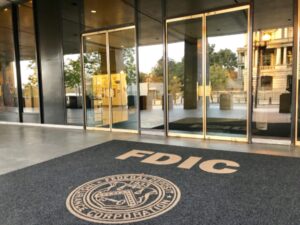The US banking sector has been relatively stable since the turbulent days of the Great Financial Crisis. Rock-bottom borrowing costs and COVID-19 powered demand for digital services had kept inflows surging. However, things changed with rising interest rates and customers suddenly taking out their deposits in Signature Bank and Silicon Valley Bank in March 2023.
The Federal Deposit Insurance Corporations (FDIC) and other regulators raced to the rescue, fearing a wider banking meltdown. Many depositors, remembering the panic of the 2008 crisis, remained nervous. Would their deposit accounts be protected, despite President Biden’s pledge that they could “rest assured that our banking system is safe?”
How the FDIC Safeguards Your Money
The agency was first established in 1933 during the Great Depression to create confidence in the banking system. Between 1930-1933, over 9,000 banks failed, representing about a third of those in existence at that time.
The system of 4,700 member institutions has worked extremely well over the decades. Since 2001, only 563 banks have gone under, with most of those collapsing during the 2007-2009 recession. From 2020 until early 2023, only a handful of banks have shuttered, including:
+ Silicon Valley Bank (California)
+ Bank (New York)
+ Ericson State Bank (Nebraska)
+ The First State Bank (West Virginia)
+ First City Bank of Florida (Florida)
+ Almena State Bank (Kansas)
A bank itself applies for FDIC insurance and pays the premiums. While the primary duty of the agency is to insure deposits, it also plays an ancillary part as a supervisor and examiner to make certain banks and savings associations operate soundly. Moreover, it is the main federal regulatory agency for those state-chartered banks that do not belong to the Federal Reserve System.
If a bank goes under, the FDIC provides its customers with access to funds, and becomes the receiver of the failed institutions. Meaning, it has authority to sell or collect assets and settle debts. A key role is to find another healthy bank to take over the business of the closed operation.
Is Your Money Covered?
Depositors themselves need not apply for coverage, which automatically protects their funds. Nor do they need to file any insurance claims to recoup any potential losses.
FDIC insurance protects the following types of accounts: checking, negotiable order of withdrawal (NOW), savings, and money market deposit. It also shields certificates of deposit (CDs), cashier’s checks, and money orders. The FDIC will not reimburse you for stocks, bonds, mutual funds, crypto assets, life insurance policies, safe deposit boxes, or US Treasuries. US Treasuries are backed by full faith and credit of the US government.
FDIC coverage is $250,000 per depositor, per bank, per account ownership category, which includes interest accrued within the cap amount. Thus, you can be covered up to a quarter of a million dollars if you carefully divide up the funds. If you hold deposits in separate branches of the same bank, they will be lumped together for the reckoning.
Spread Your Cash
You might be sitting on a pile of cash. For instance, you may have just sold a home or be saving up for a new one or come into an inheritance. You might be recently retired or reallocating investments.
The ownership category is a useful way to create several distinct account types, each entitled to its own $250,000 cover. Categories include single and joint accounts, retirement accounts like IRAs, revocable trust accounts like PODs, and employee benefit plans.
For example, spouses could each hold a single account in the same bank, plus a joint account together: together they would receive a total of $500,000 in insurance.
It might take several years to recover deposits over the $250,000 threshold, while the FDIC sells off the failed bank’s assets. Then, it normally issues periodic payments on a cents-on-the-dollar basis.
Review any cash holdings regularly with your financial advisor to be sure you are protected.